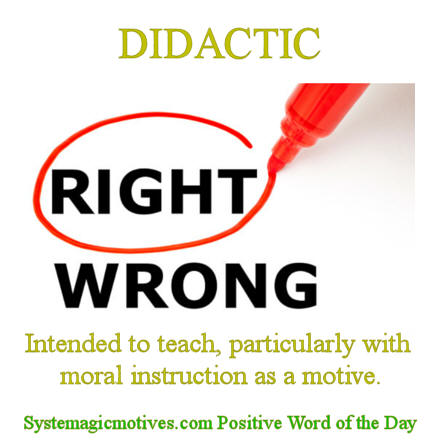

Didactic adj. Intended to teach, particularly with moral instruction as a motive.
These positive word definitions are Epididactic = Epi + Didactic
The term "didactic" originates from the Greek word "didaktikos," meaning "teachable." It describes something intended to instruct or educate, often with a focus on conveying a specific moral, lesson, or set of principles. "Didactic" is commonly used to refer to works of literature, art, or communication that are designed not just to entertain but to impart knowledge or values. This can include educational texts, moral fables, or instructional materials that aim to guide or influence the audience's understanding or behavior.
In literature and rhetoric, "didactic" often characterizes works that are explicitly aimed at teaching or instructing the audience. For example, Aesop's fables are didactic because they use storytelling to convey moral lessons. Similarly, educational texts that focus on explaining concepts or providing guidance on particular subjects are considered didactic. The didactic approach is valued for its clarity and purpose in shaping knowledge and ethical understanding.
Overall, "didactic" underscores the intent to educate and inform through structured guidance and instruction. It highlights the role of communication in not only presenting information but also in shaping the audience�s understanding and values. Whether in educational settings or creative works, the didactic approach serves as a tool for imparting knowledge and fostering learning.
Positive Nouns that Describe People